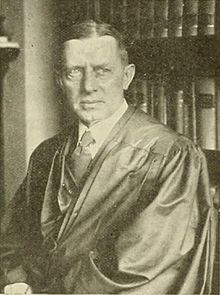Adolph A. Hoehling
| Adolph A. Hoehling Jr. | |
|---|---|

"Lehigh Alumni Bulletin", November 1, 1921
|
|
| Judge of the United States District Court for the District of Columbia | |
|
In office June 13, 1921 – December 31, 1927 |
|
| Appointed by | Warren G. Harding |
| Preceded by | Ashley Mulgrave Gould |
| Succeeded by | Peyton Gordon |
| Personal details | |
| Born |
November 3, 1868 Philadelphia, Pennsylvania, U.S. |
| Died | February 17, 1941 (aged 72) Washington, D.C. |
| Resting place | Arlington National Cemetery |
| Alma mater | Columbian University |
| Profession | Lawyer |
Adolph August Hoehling Jr. (November 3, 1868 – February 17, 1941) was a United States federal judge.
Born in Philadelphia, Pennsylvania, he was the son of Annie Tilghman Hoehling (1841–1923) and Adolph A. Hoehling (1839–1920), a rear admiral and doctor in the United States Navy's medical corps. The younger Hoehling attended Rensselaer Polytechnic Institute and Lehigh University. He received an LL.B. from Columbian University in 1889, and an LL.M. from Columbian in 1890.
He was in private practice in Washington, D.C. from 1891 to 1921. He was president of the District of Columbia Bar Association from 1916 to 1917. During World War I he served as a major in the Judge Advocate General's Corps, and was counsel to the District of Columbia draft board.
On June 6, 1921, Hoehling was nominated by President Warren G. Harding to a seat on the United States District Court for the District of Columbia vacated by Ashley Mulgrave Gould. Hoehling was confirmed by the United States Senate on June 13, 1921, and received his commission the same day.
On August 21, 1923, Hoehling re-administered the Presidential oath of office to Calvin Coolidge. Hoehling kept the second swearing in a secret until confirming Harry M. Daugherty's revelation of it in 1932. When Hoehling confirmed Daugherty's story, he indicated that Daugherty, then serving as United States Attorney General, asked him to administer the oath at the Willard Hotel. According to Hoehling, he did not question Daugherty's reason for requesting a second oath taking, but assumed it was to resolve any doubt about whether the first swearing in was valid, since an oath for a federal office had been administered by Coolidge's father, a Vermont notary public and justice of the peace.
...
Wikipedia
